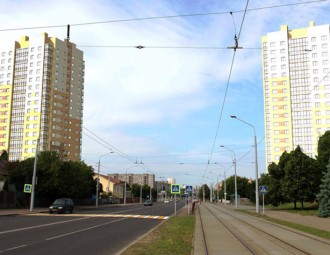“No” to illegal construction: Lawyers call upon citizens to actively fight for their rights

Civic union “Ecodom” is going to protect the right of citizens to favorable environment in court.
As Maryna Dubina, a coordinator of the “Green network” Association’s legal service, told EuroBelarus Information Service, the problem with construction of two houses at Pliahanava street and Vasniatsova street is an example of how a builder can change a project without permission and without punishment. Thus, if initially a building of two 9-stored buildings with a boiler house on the roof was approved, later on the builder enlarged the area to 19 stores, while the boiler house was placed in a landscape and recreation zone.
“During civil discussions people agreed on the initial project, which, however, was changed unilaterally by the builder without second discussion”, - explains Maryna Dubina.
She believes that it is inadmissible to act in this way since there are town-planning regulations that should be followed. Besides, the builder restricted citizen’s rights for participation in making ecologically important decisions guaranteed by the Aarhus Convention. The thing is that the bigger the buildings are, the worse “functioning” of the water and green diameter is; and project’s parameters of the parking and building of the boiler-room will destroy the landscape and recreation zone.
For this reason civic union “Ecodom” directed two inquiries to court: one to the State Construction Commission of Experts, the other – against the builder itself.
The lawyer of the civic union “Ecodom” Siarhei Mahonau notes: “We expect that the court will crack down on the builder and brings his work back to the sphere of law, which, among other things, provides for the favorable environment of city dwellers, as well as the protection of environment”.
Construction caused a lot of indignation on the part of local citizens, who wrote numerous inquiries to the state institutions. During the inspection Minsk state prosecutor’s office discovered violations of state construction norms.
Unfortunately, it is not the only one example of illegal construction in Belarus. Similar story took place in 2013 in Homel; however, the builder not only changed the number of stores, but also the placement. Back then local activists appealed to court, too; however, it didn’t satisfy their complaints.
However, there are also positive examples when citizens managed to stand up for their rights in construction sphere. When facing the violations of the legislation, Maryna Dubina, first of all, advises to be active in defending their rights.
“The most important thing is to take part in civic discussions, during which people can write their comments and wishes, take part in projects’ presentations, where experts – architects, builders, ecologists – tell about them in detail. One can find out about civic discussions from local mass media and webpages of local administration. However, it’s very important to introduce suggestions at the stage of presentation, because after the project is approved by the state bodies, it is almost impossible to influence it”, - the lawyer notes.
One more thing to do is to control the course of the project’ realization. It means that after the discussions are over citizens should ask for the protocols of these discussions from the local administration. Apart from that, they should also ask for the approved documentation in the local administration, which demonstrates how the construction conforms to the documents. When the violations of the project are obvious, citizens can appeal to the Committee of Architecture and Urban Planning, write appeals to the Prosecutor’s office, and to the court, as well as ask Minsk city executive committee to cancel the investment agreement with the builder.
“In order to win the case in court, there should be real violations in construction. Often builder’s status and connections are very important; however, citizens’ activity also has big influence”, - adds Maryna Dubina.
By the way, the builder rejected to provide “Ecodom” with the documentation, appealing to the commercial classified information, even though this information is ecological and should be available for everyone.
-
03.01
-
07.10
-
22.09
-
17.08
-
12.08
-
30.09



























